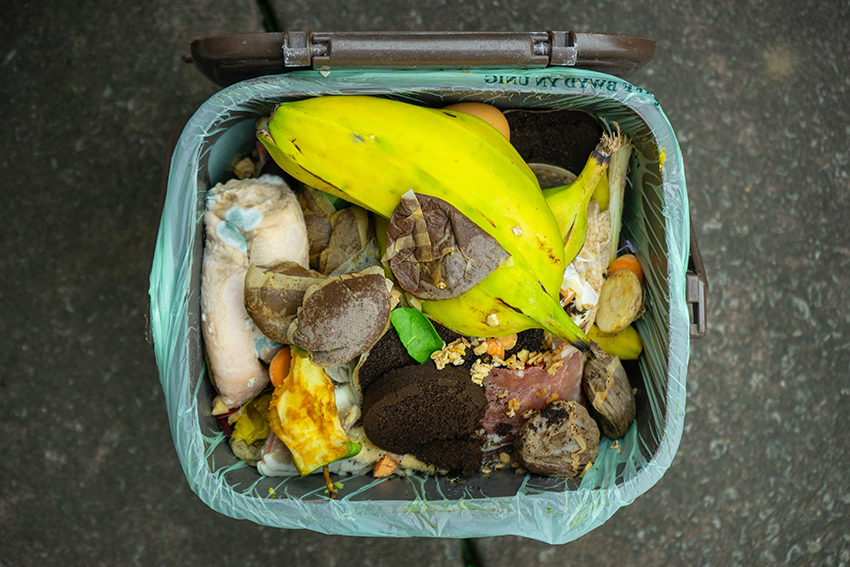
Most people are not aware, but food waste significantly contributes to climate change. Food waste and other compostable materials like yard trimmings and cardboard make up half of the trash that ends up entering California’s landfills.1 As food waste decomposes, it emits methane, which is a huge problem in California. Of note, landfills are the third-largest source of methane in California, contributing to 20% of the state’s methane emissions.1
Methane is a powerful short-lived climate pollutant and greenhouse gas that contributes to the formation of ground-level ozone, a hazardous greenhouse gas and air pollutant.2 According to the United Nations Environment Programme (UNEP), “over a 20 year period, [methane] is 80 times more potent at warming than carbon dioxide.”2 In other words, methane is a significant contributor to climate change.
California is already experiencing the devastating impacts of climate change, such as hotter summers, more extreme droughts, devastating fire seasons, and rising sea levels that erode our coastlines.1 As such, it is imperative to create sustainable and innovative solutions geared toward combating climate change at the local, state, and federal levels. At the state level, California is taking measures to address the existing climate crisis and prevent further damage.
One such measure is California’s new composting law (SB 1383) which aims for a 75% reduction in organic wastes by 2025 to tackle the climate crisis. Following Vermont, California is the second state to pass a composting mandate.3 (In 2020, Vermont banned compostable materials in landfills.) If California meets its target, the reduction of emissions would be equivalent to taking 1.7 million cars off the road.4 Also, SB 1383 requires actions to ensure that 20% of edible food is redirected to Californians who do not have enough to eat, addressing food insecurity while combating climate change. According to CalRecycle’s Local Assistance Development Branch Chief Gara Morgan, “SB 1383 is the biggest change to happen in waste management in over 30 years.”5
SB 1383 took effect on January 1, 2022, but was signed into law on September 16, 2016, by Governor Jerry Brown. Under SB 1383, jurisdictions are required to do the following:6
- Provide organics collection services to all residents and businesses
- Conduct education and outreach to the community
- Establish edible food recovery programs in their communities
- Procure recyclable and recovered organic products
- Secure access to recycling and edible food recovery capacity
- Monitor compliance and conduct enforcement
It is worth noting that “each resident and business, must subscribe to an organic waste collection service that either ‘source-separates’ the waste (e.g., separate bins), or transports all unsegregated waste to a facility that recovers 75% of the organic content collected from the system”.7 Essentially, California is mandating residents and businesses to separate compostable items from the rest of their trash. Thus, waste like banana peels, chicken bones, and leftover veggies should be separated from trash bins and placed in the appropriate container. Also, jurisdictions that fail to comply with the regulations stated in SB 1383 may have to pay penalties of up to $10,000 per day.7
The initiatives outlined in SB 1383 is a step in the right direction but would require proper education, access to appropriate resources, and potentially additional funding. To address the education piece, CalRecycle is providing jurisdictions with access to education and outreach tools centered around SB 1383. In terms of additional funding, CalRecycle estimates that more than 100 new composting facilities will need to be built around the state to meet the goals laid out in SB 1383. CalRecycle’s director Rachel Wagoner told the San Francisco Chronicle that the cost to do that could run into the tens of billions of dollars.4
Although there are hurdles that could hinder this initiative, it is important to do our part by composting as mandated. When we decrease the amount of food waste that goes into our landfills, we help to fight the negative effects of climate change one banana peel at a time. If you would like to learn more about SB 1383, click here.
Author Bio:

Queen-Ivie Egiebor, DrPH (c), MPH
Queen-Ivie Egiebor rejoined the IHPL team in August 2021 and serves as the Doctoral Graduate Assistant. Ms. Egiebor completed her undergraduate education in Biochemistry with a minor in Public Policy at the University of California, Riverside (UCR). She then received her Master of Public Health degree at Loma Linda University (LLU). Currently, she is pursuing a dual degree: an MD from UCR and a DrPH from LLU in Health Policy and Leadership.
References:
- https://www.calrecycle.ca.gov/organics/slcp
- https://www.unep.org/news-and-stories/story/methane-emissions-are-driving-climate-change-heres-how-reduce-them
- https://www.vpr.org/programs/2020-07-05/composting-101-what-you-need-to-know-about-vermonts-food-scrap-ban%20
- https://www.sfchronicle.com/projects/2022/california-compost-law-climate-change-effect/
- https://www.youtube.com/watch?v=7ZoiQVyIW3M
- https://leginfo.legislature.ca.gov/faces/billNavClient.xhtml?bill_id=201520160SB1383
- https://www.calrecycle.ca.gov/organics/slcp/education
